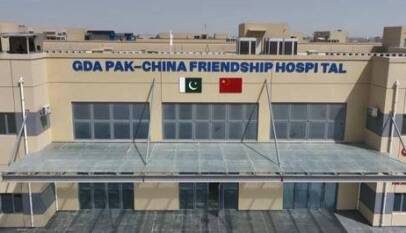National Security Dialogue for strengthening CPEC: Saad Rasool
Saad Rasool, a lawyer and an analyst, writes on the recently-held Islamabad Security Dialogue, organised by the National Security Division. He writes that the dialogue was aimed at unveiling Pakistan’s “new strategic direction based on a comprehensive security framework.” He hopes that this dialogue will be a recurring event to bridge the traditional gap between public intellectuals and policymakers. He writes that it was not a partisan event, with experts from all sides of the partisan aisle, and heads of state. He highlights that the forum moved away from the traditional notions of national security, and focussed on a broader discussion of security, involving economic activity. The forum highlighted CPEC’s North-South route as the heart of the economic transformation plan, and as the gateway to Central and Western Asia, and as an energy and trade corridor through East-West pathways. He highlights that expansion of the CPEC to the West will include re-energizing the Afghan-Pakistan Transit Trade Agreement as well.
This past week, Pakistan held the ‘Islamabad Security Dialogue’ (ISD)–a first of its kind. This two-day security symposium is organised by the National Security Division under the auspices of the enterprising Dr. Moeed Yusuf, Special Advisor to the Prime Minister on National Security and Strategic Policy.
This dialogue, in the words of Dr. Yusuf, aimed at unveiling Pakistan’s “new strategic direction based on a comprehensive security framework” that incorporates “regional connectivity and development partnerships” across the world. Through this dialogue—which, we hope will be a recurring event—Pakistan will attempt to bridge the traditional gap between public intellectuals and policy makers, while forging a new path for its peaceful regional and global aspirations.
There are many important takeaways from the ISD. For one, it was not a partisan event of the incumbent government. Participants, across various sessions, included experts from all sides of the partisan isle–Hina Rabbani Khar, former Foreign Minister from PPP, Mushahid Hussain, from PML(N), Ali Jehangir Siddiqui, ambassador at large, various non-partisan think tanks, and heads of State institutions–including the Chief of the Army Staff. It is heartening to know that, when it comes to Pakistan’s security and strategic matters, there are still those amongst us who are willing to set aside fleeting political agendas to deliberate on issues that concern our collective well-being.
Refreshingly, this security dialogue departed from Pakistan’s traditional notions of ‘national security’, which have historically focused on conventional and nuclear fire-power. Instead, a more nuanced idea of security—spanning economic progress, technological advancement, regional connectivity, knowledge entrenchment, and political stability—were discussed by some of the leading experts in the field. A clear and unequivocal articulation of this new understanding of national security came in the address of the Army Chief, when he said, “The contemporary concept of national security is not only about protecting a country from internal and external threats but also providing a conducive environment in which aspirations of human security, national progress and development could be realised.”This new concept of Security, in the words of Army Chief, is not solely a function of armed forces any more. National Security in the age of globalisation, information and connectivity has now become an all-encompassing notion; wherein, besides various elements of national power, global and regional environments also play a profound role. National security is thus multi-layered: outer layers being the exogenous factors of the global and regional environment and inner layers being the endogenous factors of internal peace, stability and developmental orientation.
This nuanced understanding of security, being acknowledged by the top military brass, is a tremendous transformation of Pakistan’s national discourse. It has announced that Pakistan no longer lives in the Kiyani-era, where our national security policy was having trouble distinguishing between ‘good’ and ‘bad’ militants. After decades of horrific violence, incalculable economic loss, and a tarnished international image, Pakistan’s ‘deep State’ has finally turned a new leaf to adopt a national security ideology that is in step with the twenty-first century.
This new and inclusive security narrative of Pakistan, articulated through the ISD, is based on a geo-economic vision, centered around three core pillars: moving towards a lasting and enduring peace within and outside, non-interference of any kind in the internal affairs of our neighboring and regional countries and boosting intra-regional trade and connectivity.
The last of the three facets, centered on economic connectivity in the region, is perhaps the most critical and avantegarde aspect of Pakistan’s new security doctrine.In many ways, while CPEC’s North-South route shall remain the heart of our economic transformation plan, Pakistan is now looking to also connect CPEC to Central and Western Asia, as an energy and trade corridor through East-West pathways. This idea of expanding CPEC to the West will include reenergizing the Afghan-Pakistan Transit Trade Agreement–opening a corridor further east.
This new economic-security doctrine, articulated through the ISD, promises a better and brighter future for Pakistan. While implementation of this ideology will require consistency in political will and a conducive domestic environment, the endeavor itself is admirable.
The world is changing and Pakistan needs to change with it. The past two decades of international policy and regional strategy have been a tremendous challenge for Pakistan. In the aftermath of 9/11, and the consequent war in Afghanistan, international powers started to view Pakistan exclusively through the lens of a ‘global Islamic terror’. Making matters worse, Pakistan had to fight its own internal war on terror, which has claimed thousands of innocent lives and cost us billions of dollars in economic fallouts.
Making matters worse, throughout this time, the enemies of Pakistan lobbied the Washington circles to permanently realign its vision of Pakistan. It was argued that the US’s policy concerning Pakistan could no long be seen in the context of South Asia or the subcontinent. Instead, Washington was gradually persuaded to view Pakistan in the context of Afghanistan alone, decoupling other countries of South Asia from this region of terror. As a result, owing primarily to India’s lobbying in Washington, a tectonic shift in the US policy took place in 2008, when Richard Holbrooke, President Obama’s special representative in the region, started using the term ‘Af-Pak’ to club Pakistan with Afghanistan, as having a single political and military situation, requiring joint policy for ‘war on terror’ in the region.
Even more importantly, with the introduction of the ‘Af-Pak’ policy by the United States, India had successfully disentangled itself from Pakistan, seeking greener pastures on the international stage. India was made apart of the Pentagon’s Quadrilateral Security Dialogue (QSD, also known as the Quad)–created in 2007 and including Australia, India, Japan and the United States.
While Pakistan was still trying to grapple with the new foreign policy, India pushed its global agenda forth. Specifically, it portrayed itself as a counter-weight to China in this region. The most concrete step in this regard came on May 30, 2018, when the United States Defence Secretary of the time, Jim Mattis, announced that Pentagon’s Pacific Command was being renamed as the ‘Indo-Pacific Command’, giving India a larger role in the Pacific theatre, in pursuit of containing and countering China. This was a significant policy shift by Washington. It symbolised that Delhi had convinced the Pentagon that it could serve as a counterweight to China in the Pacific region, while also destabilising China’s economic interest across the region–in particular the CPEC project. This explains India’s open threats of infiltrating Gilgit-Baltistan, and disrupting the CPEC supply route.
However, the past year has exposed India’s bluff. As China crossed over the borders of Indian-held Laddakh, claiming important vantage points in Pangong Lake and the Galwan Valley, there has been no real resistance or counter from India. In the aftermath, Nepal has also claimed territory within the Indian boundary. Making matters worse for India, the Chinese have continued to expand their influence and military presence across the Indian Ocean with no real challenge or interference from India. In fact, many areas close to India are places where the Chinese have made long-term investments, and exercise control that can result in a blockade of the Indian Navy.All attempts by India to involve its coalition partners from the Quad have fallen on deaf ears.
In this new and dynamic regional and global environment, Pakistan must take proactive steps to claim its space. The ISD was an important step in this regard.
The real challenges, however, still lie ahead. The most important of all will be Pakistan’s resolve to implement what it has articulated at the ISD. For this, our State institutions and political operatives must set aside petty quibbles, and grasp the reigns of tomorrow together.
Experts say Pakistan needs stable policies to fully utilize China’s expertise in clean energy and industrial development
Pakistan’s energy sector investments are on a complex trajectory. Despite government effor…










